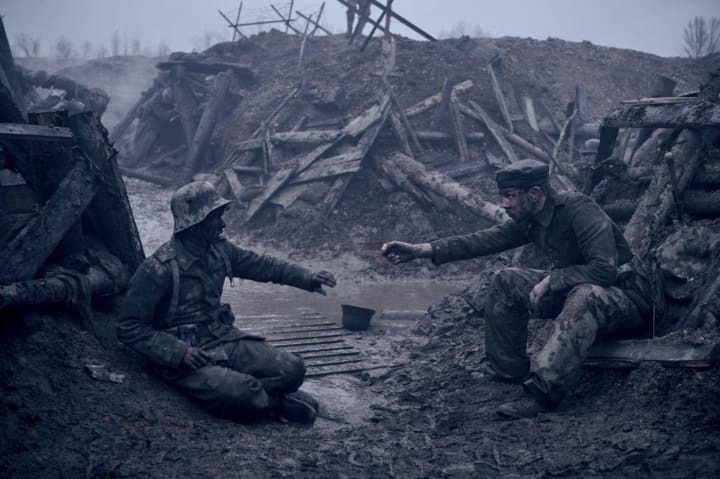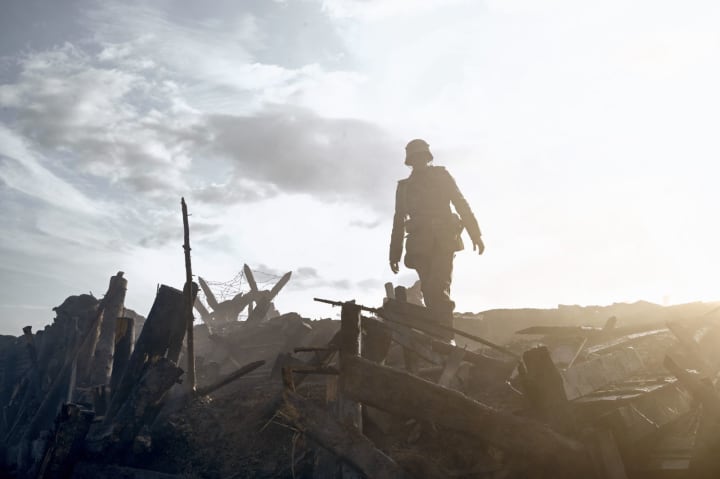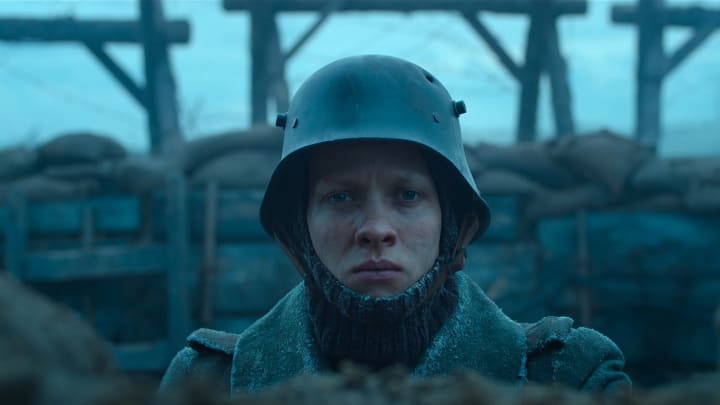Spring 1917, the third year of World War I. Four young Germans enthusiastically receive a summons to the army. One of them, Paul (Felix Kammerer), even forges his parents' signature to get to the front with his comrades as soon as possible. “In a week, Paris will be ours,” the minister ardently repeats to the mobilized, and those charged with the will to win and heroism go to the Western Front. There they meet only fear, hunger, and death. And while politicians in beautiful suits decide the fate of the country, ordinary soldiers rush into battle, not understanding why they are dying in the mud of the trenches.

Published in 1929, Erich Maria Remarque's novel All Quiet on the Western Front had a stunning effect on the public. The writer told the truth about WWI which not everyone wanted to hear: there was absolutely no point in the horrific massacre that claimed millions of lives, and its consequences were horrifying and inhuman. This conclusion irritated the ruling parties, who, having come to power, outlawed Remarque and began to burn his books. In the 1930s, the Germans did not hear the writer, and then an even more terrible massacre began.
Oddly enough, All Quiet on the Western Front was never filmed in Germany. Despite the fact that the fame of Remarque's book remains huge, the Hollywood adaptation of 1930 took two Oscars and is still included in the lists of the best anti-militarist films. Perhaps you need to have the courage to make a movie about your defeats and mistakes, and not everyone is ready to take on the dissection of historical traumas. But director Edward Berger (the author of the German drama Jack and a successful TV series, the episodes of Patrick Melrose and Your Honor) found the strength to show the generation of his grandfathers in the most unsightly, but truthful form.

His adaptation of All Quiet on the Western Front shows the familiar scenery of World War I: muddy trenches, incessant rain, and the miserable faces of soldiers waiting for an enemy shell to arrive. Berger is not looking for new technical or visual means to build warfare on screen, as Sam Mendes did in 1917. It is much more important for him to show the contrasts between this senseless massacre, and the psychological changes in the characters who have fallen into the millstones of history. However, one cannot blame Berger for bad directing either. The fight scenes are staged professionally and intensely, the spirit of the times is perfectly conveyed in costumes and scenery, and the author does not overdo it with naturalism in depicting violence.
Although Berger filmed Remarque quite freely, it is clear that it is important for the director to convey the spirit and intent of the original source. The picture wonderfully shows the insane kaleidoscope of war, as the killed Germans are routinely replaced by new young mobilized ones. Berger identifies an ordinary soldier with a thing - the uniform is removed from the body of the deceased, and then it is altered and given to a new one, only after tearing off the worn patch with the name of the former owner. In the same way, a person turns into a brass dog tag with a name and date of birth, which, with luck, will be found by living comrades in the trenches or on the battlefields. The good-natured soldier Kaczynski (Albrecht Schuch) at one point calls himself simply "boots with a gun." War as a process of dehumanization and degradation is shown in the film with impressive persuasiveness. And the main character Paul, this cheerful German young man, in the finale becomes an indifferent machine with a pale face and empty eyes.

While the unfortunate young soldiers, who dreamed of exploits in a victorious campaign, are dying for nothing, another storyline of the film unfolds in parallel - negotiations between the German government and the French. Here the main character is Matthias Erzberger, played by actor Daniel Brühl, a depressed politician who realizes the scale of the catastrophe in which his country found itself and who lost his son in the war. He is forced to argue with the military leadership, eager for victory at any cost, and then beg for a humiliating peace from France. And while the conflict is going on, and the signature on the peace treaty has not yet been signed, the generals, distraught from power and blood, continue to send soldiers to certain death. Berger does not miss the chance to show the pompous military leader, who announces a senseless attack just a couple of hours before the end of the war, the face of future human tragedy.
All Quiet on the Western Front is a relevant and important reminder that darkness and horror always hide behind beautiful slogans about victory. Berger, following Remarque, does not reveal any new truths, does not rethink the events of World War I, but clearly demonstrates the chaos and absurdity of the massacre, and the terrible effect that it has on people. War is no place for man. Violence is an infection, a plague that strikes everyone with terrible speed. I would like Remarque's legacy to remain in the past, but the fact that his film adaptation today causes such sharp feelings means that you need to return to him much more often. Then, perhaps, the words A Farewell To Arms! will finally sound.






Comments
There are no comments for this story
Be the first to respond and start the conversation.